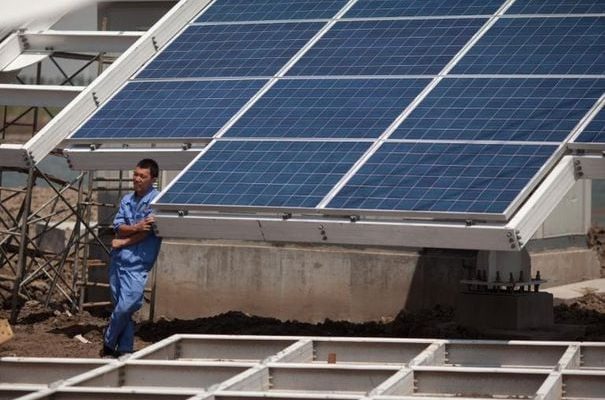The EU is toughening its tone. Brussels announced on Wednesday investigations targeting Chinese groups in solar energy, including the world number one in the sector, suspected of having received subsidies distorting competition in the European market, against a backdrop of commercial tensions between China and the EU.
After automobiles and rail, the EU is looking into the photovoltaic industry: these investigations are launched as the Twenty-Seven seek to strengthen their renewable energy parks while reducing their strong dependence on China in the wind and solar.
The procedures, targeting two separate consortia, are part of new rules that came into force in mid-2023 to prevent third-country subsidies suspected of creating unfair competition in the EU in calls for tender. The first targeted consortium brings together the Romanian group Enevo and a subsidiary – based in Germany – of the Chinese giant Longi, the world’s leading manufacturer of photovoltaic cells.
The second combines two subsidiaries entirely controlled by the same Chinese state group, Shanghai Electric, under close supervision of the central government. These two consortia are candidates to design, build and operate a photovoltaic park in Romania, with an installed capacity of 110 MW, partially financed by European funds.
Four months to decide
However, the new regulation requires companies to notify Brussels of their participation in public calls for tenders in the EU “whose estimated value exceeds 250 million euros, and if they have benefited from “at least 4 million ‘euros of foreign financial subsidies over the previous three years’.
“Following a preliminary examination, the Commission considered it justified to open in-depth investigations, because there is sufficient evidence indicating that (these groups) have benefited from foreign subsidies distorting the conditions of the internal market” to the detriment of other businesses, she emphasizes.
The European executive, which has four months to decide, can either give the green light, or prohibit the companies identified from participating in the Romanian call for tenders, or accept the measures proposed by the groups themselves to remedy the situation. possible distortion. “The opening of an in-depth investigation does not prejudge its outcome,” insists Brussels.
“Play by the rules”
“Solar panels have become of strategic importance for Europe […] These investigations aim to preserve Europe’s economic security and competitiveness, by ensuring that businesses in our single market are truly competitive and play by the rules”, assures Internal Market Commissioner Thierry Breton.
The EU has set itself the objective of achieving at least 42.5% renewable energy in its consumption by 2030, compared to 22% currently.
The accelerated deployment of photovoltaic panels is facilitated by the collapse of prices on the world market, but has also reinforced dependence on China: the EU imports 97% of its solar panels, for the majority of Asian giant, according to Brussels. Severe global oversupply and massive imports are keeping European manufacturers under severe pressure.
-“Economic coercion”-
Brussels opened its first investigation in mid-February within the framework of the new anti-subsidy regulations, targeting a subsidiary of the Chinese railway manufacturer CRRC, the world number one in the sector.
This state group, a candidate for the supply of electric trains in Bulgaria, finally withdrew from the call for tenders at the end of March. The Chinese Chamber of Commerce in the EU said on Wednesday it was “gravely concerned” by these investigations, expressing its “serious dissatisfaction with […] to the use of this regulation as a new tool of economic coercion” in green technologies.
The organization denounces “excessive discretionary power granted to the Commission” and “too broad and ambiguous definitions” concerning foreign aid “imposing excessive and potentially discriminatory burdens on foreign companies, including Chinese”.
In another regulatory framework, the EU launched an investigation in September into Chinese public subsidies for electric automobiles, in order to defend the European industry in the face of prices deemed “artificially low”.
At the same time, the EU agreed in February on regulatory relief which should strengthen the competitiveness of its green technologies vis-à-vis China and the United States.
